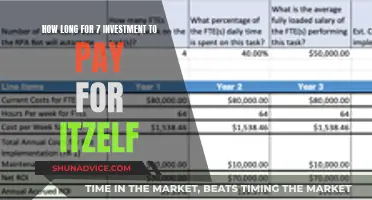
If you think you've been scammed, it's important to act quickly to protect yourself from further losses and help prevent others from becoming victims. Here are some steps you can take if you believe your investment has been scammed:
1. Stop paying any more money: It's important to stop making any further payments to the suspected scammer. Legitimate investments don't usually ask for frequent additional fees.
2. Gather information: Create a file with all the relevant information about the scam, including names, contact information, websites, and a timeline of events.
3. Report the scam: Contact the relevant authorities, such as the Federal Trade Commission (FTC) in the US or Action Fraud in the UK, as soon as possible. Reporting the scam can help stop the fraudsters and prevent others from being victimized.
4. Protect your accounts and identity: If you provided payment or personal information, take steps to block access to your accounts and protect your identity. Contact your bank and credit card companies to report any fraudulent charges or withdrawals and consider placing a fraud alert or credit freeze on your credit file.
5. Seek legal advice: Consult an attorney or a financial advisor to explore your options for recovering your losses, such as through a civil lawsuit, arbitration, or mediation.
6. Learn from the experience: Reflect on the events that led to the scam and educate yourself about common scam tactics to build your resistance and avoid falling victim to scams in the future.
| Characteristics | Values |
|---|---|
| First steps | Stop further losses, gather information about the scheme and perpetrators, and report the crime as soon as possible |
| Don't pay any more money | Be wary of schemes that ask for more money in return for larger returns |
| Collect information and documents | Develop a timeline, collect documents and information that could help when it's time to report or investigate the fraud |
| Protect your identity and accounts | Block access to your accounts, protect against identity theft, and contact your card issuer immediately if you used a credit card |
| Report the fraud to regulators and law enforcement | U.S. Securities and Exchange Commission, FINRA, NASAA, National Association of Insurance Commissioners, National Futures Association, U.S. Commodity Futures Trading Commission, Federal Trade Commission, local law enforcement, district attorney, attorney general, and FBI |
| Consider your options | Attempt to recover assets through a civil lawsuit, arbitration, or mediation |
| Follow up | Review the steps taken and follow up with law enforcement agencies or organizations that serve victims |
What You'll Learn
- Document the scam: Write down all relevant details, including names, contact information, and timelines
- Report the fraud: Notify federal and state agencies, law enforcement, and consumer protection units
- Know your rights: Understand your rights as a victim and seek resources for support
- Protect your identity and accounts: Block access to your accounts and take steps to prevent identity theft
- Recover your finances: Consult financial professionals and explore options like civil lawsuits, arbitration, or mediation

Document the scam: Write down all relevant details, including names, contact information, and timelines
If you think you've been scammed, it's important to act quickly to protect yourself and help others. Here are some detailed steps to help you document the scam:
- Write down the names of people involved: Note down the names of individuals you interacted with, including the scammers themselves, as well as any aliases or titles they used. If you're aware of the names of other victims or accomplices, write those down as well.
- Gather contact information: Collect all the contact details you can find, including phone numbers, email addresses, and website URLs. Save emails electronically or print them with full header information. Take screenshots of websites and online profiles.
- Record investment information: Document any details related to the investment opportunity presented to you. This includes purported regulatory registration numbers, investment amounts, promised returns, and any other relevant financial information.
- Create a timeline: Organise the information you have into a chronological order. Note down the dates and times of phone calls, emails, or other interactions with the scammers. Include important dates related to the investment, such as when you transferred funds or noticed something suspicious.
- File relevant reports: Obtain a copy of any police reports you filed and include them in your documentation. Additionally, request your current credit report from all three major credit reporting companies and add it to your records.
- Keep records of conversations: Make notes about the content of phone calls and other conversations with the scammers. If possible, include details such as dates, times, and any specific information discussed.
- Save all relevant documents: Collect and safely store any documents related to the scam, such as account statements, trade confirmations, sales materials, receipts, and correspondence received.
- Secure your personal information: If you shared sensitive information, take steps to protect your identity and accounts. Consider placing a fraud alert or credit freeze on your credit file and updating passwords for any compromised accounts.
By following these steps, you can comprehensively document the scam, which will be crucial for reporting the fraud to the relevant authorities and seeking potential recovery options. Remember to keep all this information in a secure location, such as a password-protected folder or a locked physical file.
The Magic of Compounding: Unlocking the Secret to Doubling Your Money
You may want to see also

Report the fraud: Notify federal and state agencies, law enforcement, and consumer protection units
If you have been scammed, it is important to report the fraud to federal and state agencies, law enforcement, and consumer protection units. Here are some steps you can take:
Report the fraud to federal and state agencies:
- Contact the U.S. Securities and Exchange Commission (SEC) at (800) SEC-0330 or file a complaint online.
- Report the fraud to the Financial Industry Regulatory Authority (FINRA) at (844) 574-3577 or file a tip online.
- Contact the North American Securities Administrators Association (NASAA) at (202) 737-0900 or file a complaint.
- Report the fraud to the National Association of Insurance Commissioners and file a complaint with your state commissioner.
- Reach out to the National Futures Association at (312) 781-1410 or file a complaint.
- Submit a complaint to the U.S. Commodity Futures Trading Commission (CFTC) at (866) 366-2382 or file a tip or complaint.
- File a report with the Federal Trade Commission (FTC) at (877) 382-4357 or online at ReportFraud.gov.
Report the fraud to law enforcement:
- Contact your local law enforcement office to file a police report.
- Get in touch with your local district attorney's office.
- Report the fraud to your state's attorney general's consumer protection and prosecution units.
- Contact your local FBI field office, submit an online tip, or file a complaint through the FBI's Internet Crime Complaint Center.
Report the fraud to consumer protection units:
- Contact the consumer protection division of your state's attorney general's office.
- Reach out to consumer protection organizations in your area for guidance and support.
Remember to act quickly and report the investment scam to as many relevant agencies as possible. This will help authorities put a stop to the fraud, prevent others from being victimized, and pursue the criminals responsible.
Smart Ways to Invest Your $50
You may want to see also

Know your rights: Understand your rights as a victim and seek resources for support
If you have been a victim of an investment scam, it is important to know your rights and understand that you have avenues for recourse and support. Here are some steps you can take to navigate the situation effectively:
Know Your Rights:
Start by educating yourself about your rights as a victim of a crime. In many countries, federal and state laws provide rights and protections for victims of crime, including financial scams. Contact your nearest attorney's office or legal aid organisation to learn more about your specific rights and the resources available to you. They can provide guidance on legal options and next steps.
Report the Scam:
It is crucial to report investment scams to the relevant authorities as soon as possible. This helps put a stop to fraudulent activities, prevent others from becoming victims, and increase the chances of recovering your losses. Contact your local law enforcement, district attorney's office, federal law enforcement agencies, and dedicated financial regulatory bodies such as the Securities and Exchange Commission (SEC) or the Financial Industry Regulatory Authority (FINRA).
Document and Collect Evidence:
Create a comprehensive file of all relevant documentation related to the fraud. This includes the perpetrator's name, contact information, website addresses, regulatory registration numbers, and any other identifying details. Keep a timeline of events, reports made to law enforcement, and relevant correspondence or documentation. Include your recent credit reports from all major credit reporting companies to help monitor your credit health and detect any further fraudulent activity.
Protect Your Identity and Accounts:
If you shared sensitive financial or personal information with the scammers, take immediate steps to protect your identity and accounts. Contact your credit card companies and financial institutions to report the fraud and consider placing a fraud alert or credit freeze on your credit files. Update login credentials and passwords for any compromised accounts, and be vigilant about monitoring your accounts for any suspicious activity.
Seek Emotional Support:
Recognise that the impact of financial fraud goes beyond monetary loss. Many victims experience severe emotional consequences such as stress, anxiety, insomnia, and depression. Reach out to support groups, counselling services, or mental health professionals to help you cope with the emotional fallout of the scam. You don't have to go through this alone.
Prevent Future Scams:
Unfortunately, once you've been a victim of investment fraud, you become a target for similar scams or "recovery scams" that prey on vulnerable individuals. Stay informed about the latest fraud schemes, be cautious of unsolicited investment offers, and always verify the legitimacy of any investment opportunity before proceeding. Consult trusted sources and seek a second opinion from financial advisors or professionals you know and trust.
Invest in IoT's Future Today
You may want to see also

Protect your identity and accounts: Block access to your accounts and take steps to prevent identity theft
If you've been the victim of an investment scam, it's important to take immediate action to protect your identity and accounts. Here are some detailed steps to help you secure your personal information and prevent further damage:
Credit Cards:
- Contact your credit card company immediately and report the fraud. They will guide you through the necessary steps, which may include getting a new account number.
- Consider placing a fraud alert on your credit file with one of the three national credit reporting companies. This will notify potential creditors to verify your identity before extending additional credit in your name.
- Alternatively, you can request a free security freeze. This restricts access to your credit file, making it harder for identity thieves to open new accounts in your name.
- If you used a debit card for the transaction, contact your bank immediately and ask about your options. They may advise you to close the account and open a new one.
Bank Information:
- If you provided your bank account number or routing number, contact your bank or credit union right away. They will advise you on the best course of action to protect your account.
- Consider changing your account number and enhancing security measures to prevent unauthorized access.
Social Security Number:
- Place a fraud alert or credit freeze on your Social Security number. Report your information as stolen at the FTC's identity theft website.
- Be cautious of scams claiming that your Social Security number is linked to back taxes or other debts. Always independently verify such claims with the IRS or creditors before paying any money.
Logins and Passwords:
- If you registered for access to the scammer's website, change your login credentials immediately. Use strong, unique passwords for all your accounts.
- Avoid reusing passwords, and consider using a password manager for added security.
Identity Theft Recovery:
- Report identity theft and get recovery steps at identitytheft.gov. This website provides valuable resources and guidance on protecting your identity.
- Stay vigilant and monitor your accounts and credit reports for any suspicious activity.
Remember, the key to protecting your identity and accounts is to act quickly and take the necessary precautions. By following these steps, you can minimize the potential damage caused by the scam and enhance your overall digital security.
Dividend Dilemma: Exploring the Intricacies of Payouts and Investments
You may want to see also

Recover your finances: Consult financial professionals and explore options like civil lawsuits, arbitration, or mediation
If you have been scammed, it is important to know that you are not alone. A study by the FINRA Foundation found that nearly two-thirds of fraud victims experience at least one severe emotional consequence, including stress, anxiety, insomnia, and depression. The financial toll can also be devastating and long-lasting. While full financial recovery might be difficult to achieve, there are legitimate avenues to pursue to recover your finances. Here are some steps you can take:
Consult Financial Professionals
It is important to consult financial professionals who can provide expert guidance and support. Consider reaching out to civil attorneys experienced in financial fraud cases. They can advise you on the available remedies and legal options, such as civil lawsuits, arbitration, or mediation. Keep in mind that civil lawsuits can be time-consuming and costly, and even if you win, collecting on a judgment can be challenging.
Civil Lawsuits
Civil lawsuits are a legal avenue to seek financial recovery. You can file a lawsuit against the scammer or the company involved in the fraud. However, keep in mind the potential challenges, including the time and cost involved. Consult with a civil attorney to understand the specific process and your chances of success.
Arbitration
Arbitration is a formal alternative to litigation that can be faster, cheaper, and less complex than a court case. In arbitration, the disputing parties choose a panel of one to three neutral third parties, called arbitrators, to resolve their dispute. The panel's decision, called an "award," is final and binding. This option can be considered if you want to avoid the lengthy and costly process of a court case.
Mediation
Mediation is an informal process where a trained, impartial mediator facilitates negotiations between you and the other party. The mediator helps both parties find a mutually acceptable solution. This option can be explored if you are open to negotiating and finding a resolution outside of the legal system.
Report to Authorities and Seek Support
In addition to consulting financial professionals, it is crucial to report the fraud to the relevant authorities. Contact your local law enforcement, district attorney, state financial regulator, attorney general, and federal law enforcement agencies such as the FBI. By reporting the scam, you can help protect others from falling victim and increase the chances of recovering your finances. Additionally, consider seeking emotional support to cope with the impact of the scam.
Shares: Time to Invest?
You may want to see also
Frequently asked questions
Investment fraud happens when scammers trick you into investing money. They might ask you to invest in stocks, bonds, currency, or even real estate. They might pretend to be telemarketers or financial advisors, and they will try to earn your trust so that you give them money quickly and without asking questions.
Some common investment scams include Ponzi and pyramid schemes, boiler room scams, pump and dump schemes, advance fee fraud, cryptocurrency scams, and affinity fraud.
Some red flags that may indicate investment fraud include guarantees of high returns with little or no risk, a sense of urgency or limited-time offers, ambiguity or misleading facts, unsolicited offers, and offers that sound too good to be true.
If you think you've been the victim of investment fraud, it's important to act quickly. Document everything you can remember about the scam, including the names and contact information of the perpetrators, regulatory registration numbers, and a timeline of events. Report the fraud to federal and state agencies, law enforcement, and your state's attorney general's office. Consider your options for recovering your losses, such as through a civil lawsuit, arbitration, or mediation.
To protect yourself from investment scams, always do your own research and be cautious of unsolicited offers. Verify the background of anyone offering you an investment and be wary of common tricks used by con artists, such as promotional videos, social media posts, or emails that create a sense of urgency.







